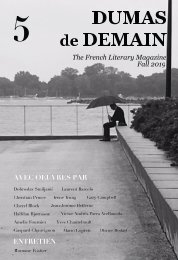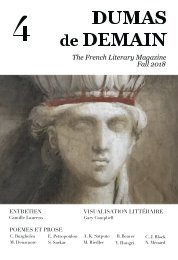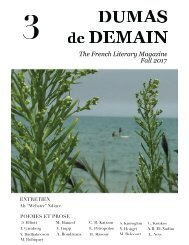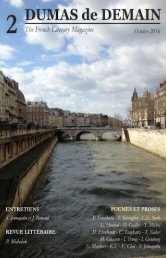Dumas de Demain: The French Literary Magazine Vol. 7
Create successful ePaper yourself
Turn your PDF publications into a flip-book with our unique Google optimized e-Paper software.
understanding — across political, religious, ethnic, racial, etc. lines
— in the world today?
When I wrote that Roscelin and Abelard "perfectly understood one
another" I meant that they shared an understanding of their social and
ideological positions, although they acted horrendously toward one
another. I would not take them as a model of "understanding" in the
sense of good will toward people of different opinions, backgrounds,
etc. Roscelin remains a shadowy figure, mostly indirectly known, so I
won't try to guess his ethics. From what remains of Abelard's
writings, it can be said that he had a complex understanding of what
it is to be human, rational, and Christian. This did not help him much
in his life, which was marked by violent quarrels, exclusions, and
exile, in part because of his own temper, in part because of
established intolerance and violence in the culture of his times. Can
his writings and the story of his life help us to solve our own
conflicts? Probably not, but they can help thinking about them. It is
unfortunate that we don't have as much preserved from the thoughts,
sayings and writings of another philosopher and theologian he was
associated with: Heloise. She may have a few things to tell us about
crossing boundaries.
7. You note that Abelard, rather than inheriting the ideas of one
philosopher, “inherited quarrels and ways of quarrelling” from his
predecessors (Chapter 8, pg 188). You also note that the “practice
of philosophy becomes strongly associated with hostility rather than
with friendship – both being equally phantasmatic” (Chapter 8, pg
190). How, if at all, do you believe philosophy’s association with
hostility and disagreement has impacted relationships and
interactions between people today? Can philosophy recover from
this association and, possibly, guide other polarized fields such as
politics to more civil forms of disagreement and dialectic?
Your question made me realize that in my book I have forgotten to
signal that as hostile and quarrelsome these medieval philosophers
and theologians look to us when we study closely their exchanges
and relations, at least they did not routinely kill one another in
tournaments and warfare, as did many of their male relatives. The
clerical culture (medieval philosophers were clerics) was influenced
10 | DUMAS de DEMAIN









